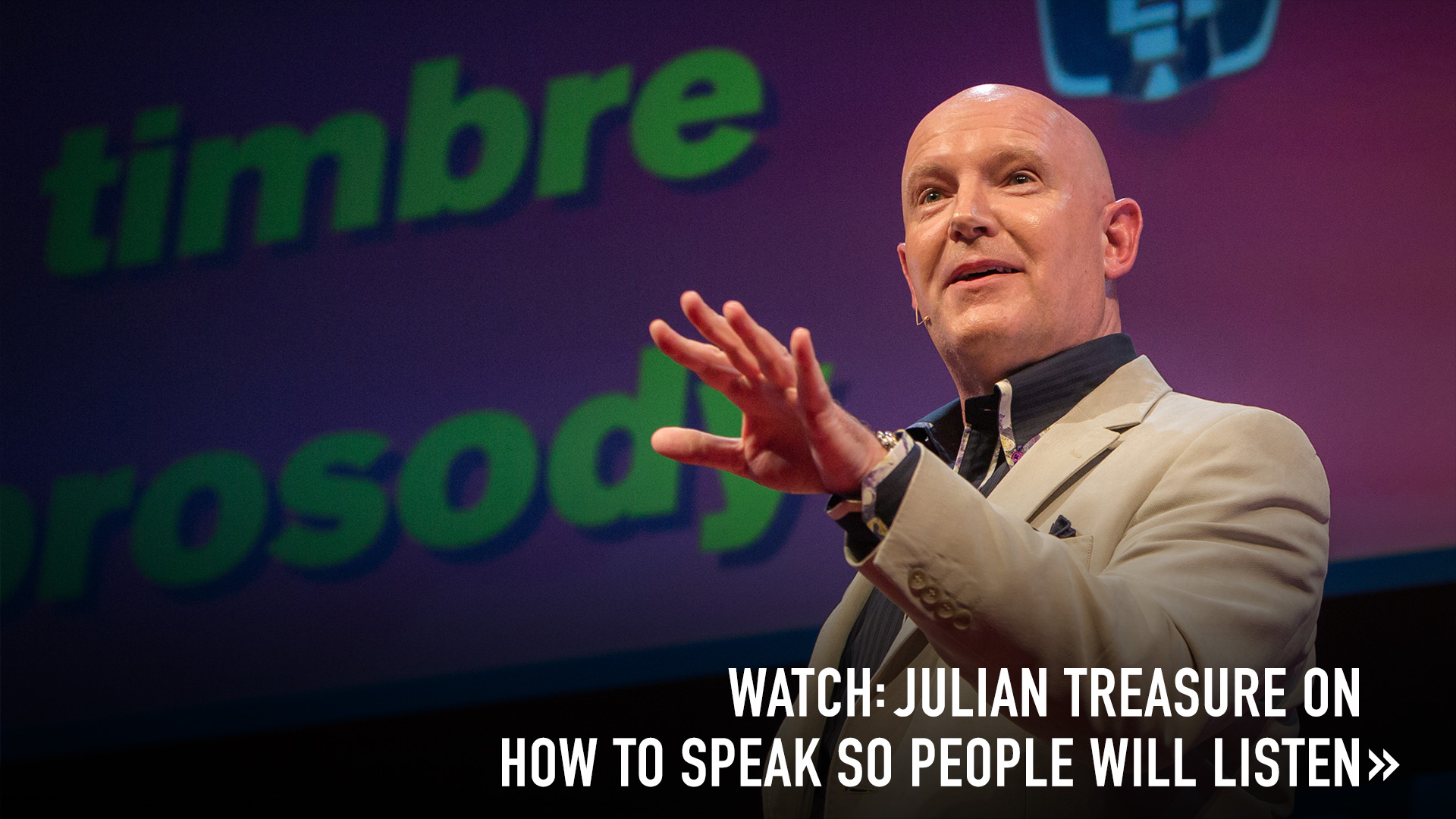
Yes, we all do these things, but they can suck the life from your conversations, says sound consultant Julian Treasure. Read this and strengthen your gift of gab.
Over the years, I’ve identified a set of common emotional drivers that suck the power out of communication. I call them the four leeches. Most people — me included! — have most, or all, of them in some form. I’m not suggesting they’re bad, wrong or to be condemned outright; the trick is to be conscious of them and not let them run the show.
Leech #1: Looking good
We all like to look good. However, this basic human desire can often get in the way of our listening and our speaking. This tendency often evinces itself in two simple words: “I know.” But if I know everything, what can I learn? Absolutely nothing. A Zen proverb sums up this proposition nicely: “Knowledge is learning something every day. Wisdom is letting go of something every day.”
It’s deflating to be around someone who is impossible to impress. Communication expert Trisha Bauman told me a story that illustrates this very well. She moved to Paris and thought she’d become inept at conveying her excitement at the sights she was encountering. Every time she extolled the beauty of a landmark, her new friends responded with a shrug. It took time for her to realize the issue was not with her; in that circle of people, if not in Paris, it was considered a loss of face to be seen to be impressed by anything. That’s all very well, but this behavior is a joy-kill. Joy is such a rare commodity in this world that it seems tragic to go around killing it.
A more subtle way of looking good that tarnishes communication is what I call “speechwriting.” As that irrelevant noise — you speaking — is going on in front of me, I am concentrating on composing my next brilliant monologue. This practice often produces the “anyway…” non-sequitur that ignores what was just said and moves the topic to a completely different place. It’s a trait that often afflicts people in power, even though it’s not a good style of leadership.
One step up from speechwriting is competitive speaking. This potent form of joy-killing is all about looking good. For example, let’s say I enthuse, “We’re so excited to be going to Greece on holiday this year.” The competitive speaker will jump in with, “Oh yes, I’ve been to Greece six times and I love it!” My feeling: deflation. My joy has been made to look second-rate.
Leech #2: Being right
If there is one thing we like more than looking good, it’s being right. When I am right and you are wrong, it makes me feel I am better than you. The desire to be right can be very destructive in relationships. As the therapist and educator Harville Hendrix has said, “Do you want to be right, or do you want to be in a relationship? Because you can’t always have both. You can’t cuddle up and relax with ‘being right’ after a long day.”
The need to be right can arise from a fear of being disrespected. Or it may come out of the fear of being seen as we really are, as flawed human beings who are perfectly imperfect and full of contradictions and confusions. We yearn to feel justified and respected, and being right — or making others wrong — is the route we choose to achieve these desires because it sets us above other people.
Interrupting springs from the desire to be right. This might be the result from speechwriting, but it often arises with no planning at all — simply from the desire to disagree, demand an answer, or make a point now, without waiting for the other person to finish. Interrupting is becoming more common in our impatient world, even in matters of life and death. One survey of physicians in the US and Canada found that patients were interrupted an average of 18 seconds into their opening statements; less than one-quarter were allowed to complete what they wanted to say.
Interrupting has two unfortunate consequences. We don’t hear what the other person says, which might be useful, enlightening or not what we expected. And it most likely damages the rest of the conversation by changing the dynamics — the interrupter is exercising their dominance — as well as the emotional context. The interrupted person may feel belittled and offended, giving rise to anger, resentment and the unwillingness to be open. While interrupting is not always wrong, it should never become a habit.
Leech #3: People pleasing
If someone is — or is perceived to be — driven by people-pleasing, it robs their speech of power. Honesty and authenticity are absent, and these are key foundations for strong communication. People pleasers might say yes when they mean no, or agree to going out when they’d much rather stay in. They may concur with opinions that they fundamentally disagree with in order to be liked. While we all have this desire to have other people like us, it’s a question of degree.
If you find yourself people-pleasing overmuch, take some time to think about your own values. Ask yourself: What do I stand for? What is important to me in life? What is not negotiable? Write down everything that comes to you. When you have your core values clear, it becomes much easier to stand in them and not be blown around by other people’s opinions or needs.
Leech #4: Fixing
Fixing is about trying to make it all right. “Don’t cry” or “Don’t be upset” is the fixer’s primary response to pain. Why is this a leech? Because sometimes people need to be upset and to express their grief, sadness, anger or other strong negative emotions.
Fixers think it’s not acceptable for others to be upset. It may derive from people-pleasing, or it may be that strong negative emotion is seen as something to be feared — either because they had too much of it in their family of origin or because of complete lack of experience of it, thanks to a family where emotional expression was unacceptable.
My aunt told me a story that illustrated how even well-intentioned fixing causes damage. When she was a little girl, her parents told her she was going to have a baby brother or sister. She was so excited, and the spare room was decorated as a nursery. Eventually, the day came and her parents went off to the hospital. She waited at home with a neighbor, but when her parents returned, they were alone. Nothing was ever said. She did eventually get two little brothers, and much, much later she learned her first brother had been stillborn — but she never forgot the confusion and loneliness she felt that day. Doubtless, my grandparents decided not to discuss it so as not to upset her. Still, the effect on her was that a bond was broken and she found it harder to trust people.
Fixing, whether by withholding like that or by distracting or obscuring with extravagant affection, denies people the feelings they need to feel. Not only that, but many fixers habitually deny themselves strong feelings. When communication is driven by the need to fix, it usually means there’s a hidden agenda at work — one that is all about the fixer’s needs, even though it may be disguised as love.
Some of these leeches may be minor or even non-existent for you. However, I’m willing to bet you can identify at least one that has affected — or is currently affecting — your opportunities in life. As you consider them and become more and more conscious of their existence in your speech, their power will be lessened. Simply shining the light of mindfulness on them should cause them to wither and shrink.
Excerpted with permission from the new book How to Be Heard: Secrets for Powerful Speaking and Listening by Julian Treasure. Published by Mango Books. © 2017 Julian Treasure.












